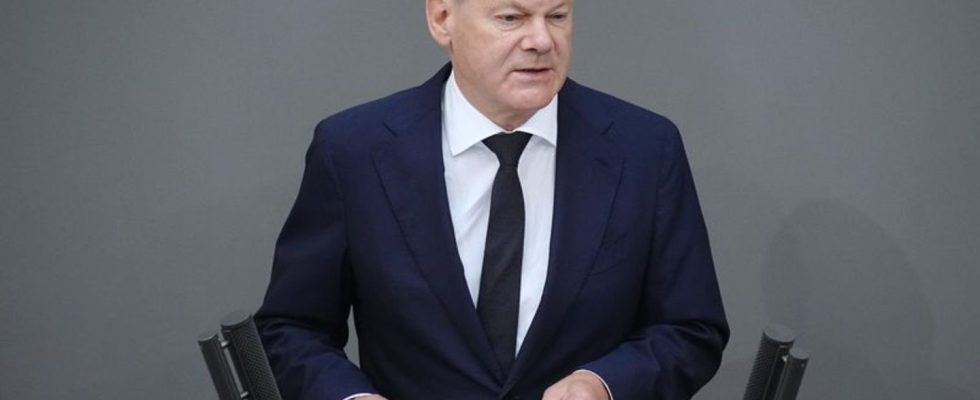government statement
Scholz: In the case of Ukraine aid, the focus is on strengthening combat effectiveness
Chancellor Olaf Scholz makes a government statement in the Bundestag. photo
© Kay Nietfeld/dpa
In his government statement in the Bundestag, Olaf Scholz emphasized Germany’s support for Ukraine. In NATO, however, the chancellor has not yet won the war party. Another country, on the other hand, does.
Before the NATO summit in Lithuania, Chancellor Olaf Scholz (SPD) confirmed that Ukraine’s accession to the alliance before the end of the Russian war of aggression against Ukraine is out of the question. The Ukrainian government has also determined this itself, said Scholz in his government statement in the Bundestag. “That’s why I’m advocating that in Vilnius we concentrate on what now has absolute priority: namely, strengthening Ukraine’s actual combat capability.”
At the NATO summit in Vilnius, Lithuania, in mid-July, the focus will be on how Ukraine can be brought closer to NATO and what security guarantees it can be given once the war is over. However, the formal invitation to NATO desired by Ukraine will probably not come about.
The Chancellor again pledged support to Ukraine as long as it is needed. He pointed out that Germany’s civil and military aid now totals 16.8 billion euros. Germany will continue to focus on armored combat vehicles, anti-aircraft systems, artillery and the necessary ammunition when it comes to arms deliveries. Germany is thus providing exactly what Ukraine most urgently needs in the ongoing offensive to liberate its territories.
Scholz insists on Sweden joining NATO soon
In view of the ongoing Turkish resistance, Scholz insisted on Sweden joining NATO quickly. He was “firmly convinced that alongside Finland, Sweden should also be a new ally at the summit table,” said the SPD politician. He is appealing to the re-elected Turkish President Recep Tayyip Erdogan to clear the way for this now – as was jointly decided at the NATO summit in Madrid last year.
Before the impact of the Russian war of aggression against Ukraine, Sweden, like Finland, applied for NATO membership in May 2022. Finland has been a member since the beginning of April, while Sweden still lacks the approval of Turkey and Hungary. Erdogan recently questioned Sweden’s accession until the NATO summit and again accused Sweden of not taking decisive action against “terrorist organizations”. Sweden recently tightened its terrorism laws, after which the country’s Supreme Court approved the first extradition of a PKK supporter to Turkey.
Scholz said the NATO summit in July would send a strong signal of transatlantic cohesion and determination to stand up for common security. “Our promise of mutual assistance in NATO is valid – without ifs and buts,” he said. At the same time, a number of decisions will be taken to adjust military planning, for example to improve protection of the underwater infrastructure.
Chancellor defends European asylum compromise
The Chancellor defended the European plans for asylum procedures at the EU’s external borders. “This is a historic agreement because it shows that the EU can overcome its differences even on the most controversial issues,” said Scholz. “Germany will also be relieved by such a new and fair system, because so far we have been the main target for largely uncontrolled internal migration within the Schengen area.”
At the beginning of June, the EU states voted in favor of comprehensive reform plans. Asylum applications from migrants who come from countries of origin with a recognition rate of less than 20 percent are to be examined within twelve weeks at the EU’s external borders. During this time, they want to oblige those seeking protection to stay in strictly controlled reception facilities. Those who have no chance of asylum should be sent back immediately.
However, it is conceivable that the EU Parliament will still push through changes. Scholz advocated reaching an agreement with the European Parliament before the European elections next year.
Germany also had to make compromises on the subject, he said. “But that was right – in the interest of Europe’s unity and ability to act,” said Scholz. The previous system does not work. In the negotiations, the federal government had advocated that families with children be exempted from the so-called border procedures. In order not to jeopardize the agreement, however, she had to accept that this could be possible.

